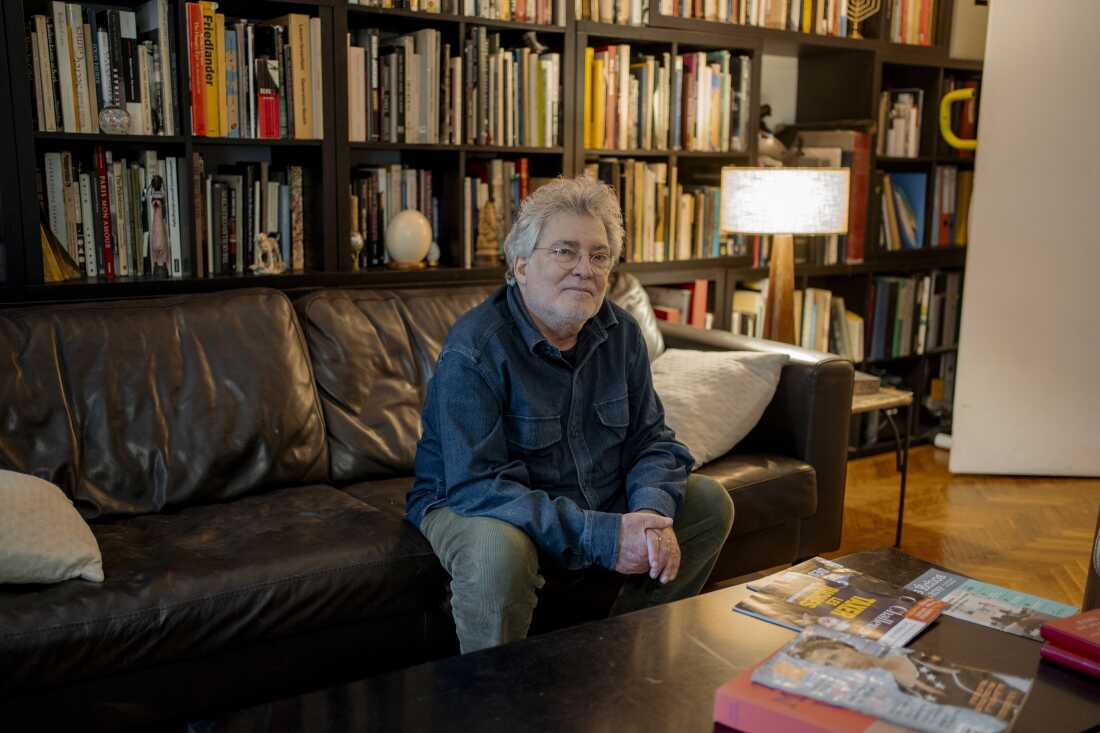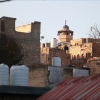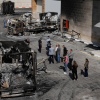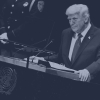French President Emmanuel Macron addresses the United Nations Common Meeting in New York Metropolis on Sept. 23.
Leonardo Munoz/AFP through Getty Photos
disguise caption
toggle caption
Leonardo Munoz/AFP through Getty Photos
PARIS — Ofer Bronchtein was delivered to tears as French President Emmanuel Macron delivered his speech to the United Nations Common Meeting in New York in September, recognizing a Palestinian state for the primary time.
“Honestly, I cried,” he instructed NPR in an interview in his Paris house after his return from New York. “I see it happening in front of me and I see the full room of the General Assembly and everyone is applauding.”
Bronchtein says his solely remorse is that the Israeli delegation walked out of the Common Meeting. The Israeli and U.S. governments opposed the transfer. Israeli Prime Minister Benjamin Netanyahu stated world leaders who acknowledged Palestinian statehood had been granting a “great reward” to the Palestinian militant group Hamas after its Oct. 7, 2023, assault on southern Israel, which triggered the battle in Gaza.
Bronchtein refutes this, arguing it’s no reward for a bunch that by no means sought a peaceable coexistence alongside Israel.
“I strongly believe that if there had been a Palestinian state before the 7th of October, if the Palestinians had been sovereign to run their lives as they wanted, the 7th of October [attack in Israel] would not have happened,” he says.
For Bronchtein, recognizing a Palestinian state on the U.N. was the fruits of his life’s work. The 68-year-old Israeli-French activist has lengthy promoted the popularity of a Palestinian state alongside Israel to assist resolve the decades-old Israeli-Palestinian battle. In recent times, he has been doing in order a casual adviser to President Macron. Now, because the French proceed efforts for a long-lasting peace within the area, the president’s unofficial envoy is pushing for Paris to play a lead position within the course of.

Ofer Bronchtein, a French-Israeli advocate for peace between Israelis and Palestinians, is a casual adviser to French President Emmanuel Macron on Center East peace, in Paris, on Oct. 10.
Agnes Dherbeys/MYOP/Redux
disguise caption
toggle caption
Agnes Dherbeys/MYOP/Redux
Speaking peace over whisky in Ramallah
Bronchtein was first launched to Macron in 2019 by a mutual pal, he says. The subsequent 12 months, he and the French chief shaped a bond throughout a presidential go to to Jerusalem, the place Macron gave a speech on the seventy fifth anniversary of the liberation of the Auschwitz demise camp, and Bronchtein was serving as Hebrew interpreter for France’s delegation.
On that journey, as Bronchtein tells it, throughout a late-night whisky they shared in Ramallah, within the Israeli-occupied West Financial institution, Macron stated he wished Bronchtein to work with him on peace within the Center East.
Macron understands the problems, and empathizes with each Israelis and Palestinians, Bronchtein explains. The president was in search of a manner for France and Europe to play a bigger position within the peace course of.
Bronchtein, president of the nonprofit Worldwide Discussion board for Peace, receives no wage for consulting Macron, he says. He is sitting at his desk coated with books and papers within the cluttered but cozy Paris house he shares together with his spouse, American photographer Hally Pencer, and their Labrador Leo.
Bronchtein’s solely situation is a direct line to Macron.
“I whisper in his ear usually after 12 o’clock at night,” when the president’s extra obtainable, Bronchtein says. “My job is to give some ideas, to react to what’s happening on the ground. Sometimes he listens to what I have to say, sometimes he doesn’t.”
A number of months after that Center East journey, Macron gave Bronchtein his first mission: to search out concepts that would deliver Palestinians and Israelis collectively. The activist spoke with a whole lot of individuals throughout each societies, and assembled what he calls a suggestion toolbox. On prime: Arab states ought to normalize relations with Israel, whereas Israel ought to acknowledge a sovereign Palestinian state. And France ought to prepared the ground on statehood recognition. “When the time comes,” Bronchtein remembers Macron all the time saying.
Life out and in of Israel and France
Bronchtein has French and Israeli passports, in addition to a Palestinian one.
He was born within the Negev desert city of Beersheba, Israel, in 1957. All of his grandparents had been born in what was then Ottoman-controlled Palestine.
His paternal grandparents moved to Tunisia, then a French protectorate, the place they gained French citizenship. Bronchtein’s father, at age 16, left Tunisia for France, and joined the Jewish resistance towards the Nazis.
After World Battle II, his father boarded the Exodus 1947, a ship crammed with a whole lot of Holocaust survivors crusing from France to start out their lives over in Palestine, which was then beneath British mandate. He went on to battle each the Arabs and the British for Israeli statehood in 1948. Bronchtein calls his father his hero.
Then in 1966, when Bronchtein was 9, the household left Israel for financial causes and moved to an immigrant suburb of Paris.
Bronchtein returned to Israel in 1975, at age 17. And there he started a lifelong battle for social justice, peace and reconciliation between Israelis and Arabs.
Jailed for assembly a Palestinian official
He labored on constructing bridges throughout the divide, even when it was forbidden. In 1987, Bronchtein met in Spain with a senior member of the Palestine Liberation Group (PLO), Mahmoud Abbas. (It was practically twenty years earlier than Abbas grew to become president of the Palestinian Authority.) Their encounter in Spain broke Israel’s ban on contacts with PLO representatives on the time. Bronchtein served 15 days in Israeli jail.
Issues circled when he grew to become an adviser to Israeli Prime Minister Yitzhak Rabin through the negotiations resulting in the Nineteen Nineties Oslo Accords. Signed by Rabin and Palestinian chief Yasser Arafat, the peace agreements outlined plans for a Palestinian state alongside Israel.

Ofer Bronchtein sits down with Palestinian Authority President Mahmoud Abbas in Paris, April 21, 2011. Abbas adopted by on a promise made by his predecessor, the late chief Yasser Arafat, to provide Bronchtein a Palestinian passport as a symbolic gesture for his peace efforts.
Ofer Bronchtein
disguise caption
toggle caption
Ofer Bronchtein
Bronchtein remembers the hope surrounding that period. “After that it was like a honeymoon,” he says. “I was living in Tel Aviv at the time. I would take my car and an hour later I was on the beach in Gaza, having dinner with my friends. I did the same thing in the West Bank. We were going in and out without any problem. Many of the Palestinians I met became dear friends of mine.”
He says Palestinians loved a few of that freedom too, for a time, however it did not final.
In 1995, Prime Minister Rabin was assassinated by a Jewish extremist. Israelis who opposed the Oslo Accords got here to energy. A Palestinian rebellion often known as the second intifada started in 2000. Bronchtein grew cynical and life grew to become harmful in Israel, with Palestinian assaults on buses. He and his spouse moved to France with their three kids.
Renewed hope for peace
Bronchtein says his hope finally returned, because of expensive pals on each side of the battle, and the need for peaceable coexistence that those that know him greatest say is a part of his soul.
In 2002, Bronchtein and a Palestinian associate, Anis al-Qaq, created the Worldwide Discussion board for Peace to foster dialogue between Israelis and Palestinians.
“Bronchtein is unique,” says John Lyndon, government director of Alliance for Center East Peace, a community of organizations selling peace between Israelis and Palestinians. Whereas Bronchtein’s peace discussion board just isn’t a member of the alliance, Lyndon says the 2 have partnered collectively on current initiatives.
“What’s great about Ofer is that he’s brought civil society’s voice and impatience into what can often be sterile governmental context,” he says. “He hasn’t lost the fact that he’s an activist. I’ve seen him be the person in the meeting that is maybe upsetting the diplomats by saying the thing they need to hear. He maintains his access and his conversations with Macron, but he also speaks truth to power.”
As a gesture for his work, Palestinian Authority President Abbas gave Bronchtein a Palestinian passport in 2011.
However the Israeli-French peace activist has drawn detractors, too. France has Europe’s largest Jewish and Muslim communities, and Center East tensions typically play out within the nation. Bronchtein says he receives insults from totally different sides over his activism, and even demise threats from extremist Jews in France and Israel. He has refused President Macron’s provide of a safety element.
“Pushing the American president in the right direction”
Bronchtein has been a powerful critic of Israel’s occupation of the West Financial institution after the Arab-Israeli battle in 1967. He believes it goes towards Jewish values and dehumanizes Palestinians, which has additionally fueled Palestinian hatred towards Israelis. And lately, Palestinians within the West Financial institution have seen a rise of their land confiscated and violence towards them by Israeli settlers.
However the stage of violence between Israelis and Palestinians within the final two years is one thing Bronchtein says he by no means imagined.
“To tell you honestly, I feel ashamed as an Israeli that some people in my name committed this terrible crime,” he says of Israel’s huge destruction of Gaza. “And lately, when I speak in front of Palestinians or even in the media, I ask for forgiveness. I hope that one day the Palestinians will forgive us for what’s happened in Gaza.”
He says Palestinians also needs to ask forgiveness from Israel “for the terrible things Hamas did on Oct. 7.”
Within the wake of such destruction and loss, Bronchtein thinks there’s a actual probability to vary the established order. He says “a lot of Israelis would like to make peace.” However lasting peace will solely be achieved when Palestinians are masters of their very own future.
He believes Hamas will someday be vanquished, however says: “You cannot kill an ideology through violence. You kill ideology by giving people a chance to hope for a better future.”
France’s diplomatic transfer on the U.N. was deeply deliberate and coordinated for months with Saudi Arabia, and led nations to revive the decision for a two-state resolution. Israel threatened retaliation for it, and President Trump initially warned it might “encourage continued battle.”
However Bronchtein and different analysts imagine France’s transfer helped lay the groundwork for President Trump’s plan for peace in Gaza.
Bronchtein says it is time for Israelis and Palestinians to jot down a brand new narrative, very like the Europeans did after the destruction of World Battle II. It ought to be a venture for the longer term the place they aren’t enemies, however finally companions, he says. A story that respects the historical past, the id and the ache of every aspect.








